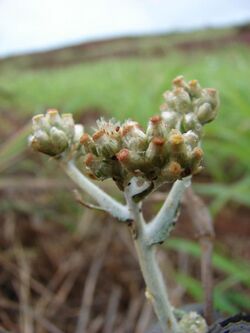Biology:Gamochaeta purpurea
From HandWiki
Revision as of 04:35, 9 August 2022 by imported>Gametune (correction)
Short description: Species of flowering plant
| Gamochaeta purpurea | |
|---|---|

| |
| Scientific classification | |
| Kingdom: | Plantae |
| Clade: | Tracheophytes |
| Clade: | Angiosperms |
| Clade: | Eudicots |
| Clade: | Asterids |
| Order: | Asterales |
| Family: | Asteraceae |
| Genus: | Gamochaeta |
| Species: | G. purpurea
|
| Binomial name | |
| Gamochaeta purpurea (L.) Cabrera
| |
| Synonyms | |
|
Gnaphalium purpureum | |
Gamochaeta purpurea, the purple cudweed, purple everlasting, or spoonleaf purple everlasting, is a plant native to North America.[1]
Description
It is a small annual herb that produces lanceolate, alternate, wooly leaves and peg-shaped flowerheads in terminal clusters. The seeds are windborne.
Habitat
It can grow on most any type of soil that is moderately moist, but prefers meadows, rocky terrain, and farmland.
Conservation status in the United States
It is listed as endangered in Massachusetts and New York, as possibly extirpated in Maine, as historical in Rhode Island,[2] and as a special concern species in Connecticut, where it is believed extirpated.[3]
Ethnobotany
The Houma people take a decoction of the dried plant for colds and influenza.[4]
Gallery
References
- ↑ "Plants Profile for Gamochaeta purpurea (spoonleaf purple everlasting )". https://plants.usda.gov/core/profile?symbol=Gapu3.
- ↑ "Plants Profile for Gamochaeta purpurea (spoonleaf purple everlasting )". https://plants.usda.gov/core/profile?symbol=Gapu3.
- ↑ "Connecticut's Endangered, Threatened and Special Concern Species 2015". State of Connecticut Department of Energy and Environmental Protection Bureau of Natural Resources. Retrieved 1 January 2018. (Note: This list is newer and updated from the one used by plants.usda.gov)
- ↑ Speck, Frank G., 1941, A List of Plant Curatives Obtained From the Houma Indians of Louisiana, Primitive Man 14:49-75, page 64
Wikidata ☰ Q11180064 entry
 |













